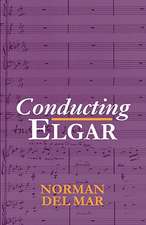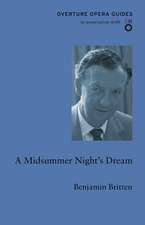Still Songs: Music In and Around the Poetry of Paul Celan
Autor Axel Englunden Limba Engleză Hardback – 28 mar 2012
| Toate formatele și edițiile | Preț | Express |
|---|---|---|
| Paperback (1) | 471.33 lei 43-57 zile | |
| Taylor & Francis – 17 noi 2016 | 471.33 lei 43-57 zile | |
| Hardback (1) | 1055.51 lei 43-57 zile | |
| ASHGATE PUBLISHING – 28 mar 2012 | 1055.51 lei 43-57 zile |
Preț: 1055.51 lei
Preț vechi: 1287.22 lei
-18% Nou
Puncte Express: 1583
Preț estimativ în valută:
202.04€ • 219.53$ • 169.82£
202.04€ • 219.53$ • 169.82£
Carte tipărită la comandă
Livrare economică 21 aprilie-05 mai
Preluare comenzi: 021 569.72.76
Specificații
ISBN-13: 9781409422624
ISBN-10: 1409422623
Pagini: 256
Dimensiuni: 156 x 234 x 16 mm
Greutate: 0.48 kg
Ediția:1
Editura: ASHGATE PUBLISHING
Colecția Routledge
Locul publicării:Oxford, United Kingdom
ISBN-10: 1409422623
Pagini: 256
Dimensiuni: 156 x 234 x 16 mm
Greutate: 0.48 kg
Ediția:1
Editura: ASHGATE PUBLISHING
Colecția Routledge
Locul publicării:Oxford, United Kingdom
Notă biografică
Axel Englund is Associate Professor of Literature at Stockholm University, Sweden. His research is primarily concerned with interrelations between the arts and media, in particular the music and poetry of the modernist era. His other fields of interest include twentieth-century exile literature, concepts of aesthetic authenticity, and representations of gender and sexuality in opera. In 2011, Englund was an Anna Lindh Fellow at Stanford University (Freeman Spogli Institute of International Studies) and he has held visiting scholarships at Columbia University (Department of Germanic Languages and Literatures) and Freie Universität Berlin (Institut für Theaterwissenschaft).
Recenzii
'This impressive debut book uses music, both as sound and as idea, to cut through the conventional wisdom about Paul Celan and to forge a more nuanced, more complex view of Celan's poetics than the one afforded by the legends that have accumulated around the poet. Axel Englund shows with meticulous argument and in lucid prose that Celan's lifelong return to figures of music forms a key arena for the playing out of his conflicted identity as a modern poet, and in particular as a poet whose modernity is over determined - but far from exhausted - by his experience as a survivor of the Holocaust.'
Lawrence Kramer, Fordham University, USA
'Axel Englund's sophisticated study of Paul Celan combines the insights of a philologist with the keen ear of a composer-musicologist. It illuminates not only the extraordinary role that music plays in Celan's conception of poetry, but also the singular impact his work has had on contemporary classical music. A milestone in Celan studies.'
Mark M. Anderson, Columbia University, USA
’The strength of the study lies in its broadly based examination of poems and musical compositions from every phase of Celan’s work’.
Modern Language Review
Lawrence Kramer, Fordham University, USA
'Axel Englund's sophisticated study of Paul Celan combines the insights of a philologist with the keen ear of a composer-musicologist. It illuminates not only the extraordinary role that music plays in Celan's conception of poetry, but also the singular impact his work has had on contemporary classical music. A milestone in Celan studies.'
Mark M. Anderson, Columbia University, USA
’The strength of the study lies in its broadly based examination of poems and musical compositions from every phase of Celan’s work’.
Modern Language Review
Cuprins
Introduction; Chapter 1 Play Death Sweeter: Musicality, Metaphoricity, Murder; Chapter 2 Fire in the Harp, in her Hair: The Lied and the Lullaby; Chapter 3 Rises and Plays: Interruptive Repetition and the Law of Musical Purity; Chapter 4 Into You, Into You I Sing: Spasmodic Speech and the Borders of the Human Body; Chapter 5 We Resound: Music In and Beyond the First Person Plural; Chapter 6 Shattered the Songs: Dissonances of a German-Jewish Musicality;
Descriere
What does it mean for poetry and music to turn to each other in the shadow of the Holocaust, as means of aesthetic self-reflection? How can their mutual mirroring, of such paramount importance to German Romanticism, be reconfigured to retain its validity after the Second World War? These are the core questions of Axel Englund's book, which is the first to address the topic of Paul Celan and music.










